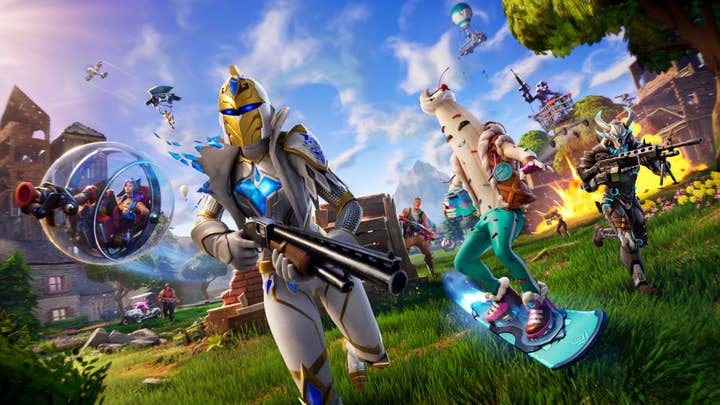Big publishers forced to innovate through M&A, says Daglow
Industry veteran revisits his predictions from ten years ago, and looks ahead to the next decade of video games
Sign up for the GI Daily here to get the biggest news straight to your inbox
Once upon a time, games veteran Don Daglow gazed into his crystal ball and told GamesIndustry.biz what he expected from the next decade in the video games business.
Ten years later (okay, 11, but Daglow's very busy and so are we), we caught up with him to see how accurate his predictions were and what he believes the future holds for the games industry.
Daglow has been involved in games development since the 1970s, working at Intellivision and Electronic Arts before founding his own company Stormfront Studios. He has numerous awards to his name, including an Emmy for technology and engineering on the original 1991 Neverwinter Nights.
As you can imagine, the conversation covered a lot of subjects, so we're going to dive straight into it.
Publishers
Ten years ago, Daglow said…
"My crystal ball says big publishers are still an important part of the landscape in ten years. I just think they will function differently than some of the models we see today. My guess, my instinct, is that, first of all, we're going to continue to have big blockbuster games on consoles and various platforms that will come from long term dedicated in-house teams of publishers... The exact structure may metamorphose a little bit."
Now
Daglow says the biggest publishers are even more "intertwined in the spider's nest of the requirements of being a public company" now than they were ten years ago. This means most are focused on growing their revenue every quarter and preventing their stock price from dropping (regardless of whether there are logical and/or uncontrollable factors as to why this is happening).
"That's the problem, because they live and die by that," he says. "The spider web just keeps trapping the larger organisations even more in what they can do, and forces them to innovate by M&A, because it gets progressively harder to innovate internally."
He also notes that the push to maximise return on interest means that managing any kind of connected or live service game – essentially anything that's not a single download without further transactions – becomes "a massive spreadsheet exercise" as publishers work out which elements to tweak in order to increase revenues.
"Within every one of the big corporations, I still see bright lights and innovative, clever work, but these are the exception, and sometimes the culture is actively working against them without intending to," he adds.
"If people are thinking about milking what they can out of a property, that's a very dangerous way to look at it, and will produce a lot of short lifespans"
If that's the case, why have so many companies gone public over the past ten years?
"Tremendous benefits in terms of access to cash, and a certain form of stability, even as you are dancing the dance of the quarter over quarter," Daglow answers. "Once you're in that dance, you're in that dance. And you can spin off wholly-owned subsidiaries and do everything else, but I don't see any big handover."
As for the next ten years, Daglow believes publishers will be "looking at how movie studios get run" in terms of business model.
"It's only going to focus on trying to create IPs that create more outbound licensing revenue, instead of simply being a great target for inbound licensing revenue," he explains. "So, I think we're going to see all those things as a logical progression, and I don't see any way that they get out of the majority of the spider web of restrictions and huge benefits."

Consoles
Ten years ago, Daglow said…
"I think that ten years from now, having a box that is attached to the big living room entertainment screen that gives you really high quality visually stunning game play is still going to happen."
Now
As regular readers of 10 Years Ago This Month well know, predicting the death of consoles was a common occurence a decade or so ago. While Daglow previously told us he believed there would always be a place for a console experience, he confesses that he, too, went on the record in 2003 to predict such devices would become obsolete.
In 2023, he maintains a more optimistic view: that there will always be demand for devices that allow longer play sessions, as these enable a different form of emotional commitment to the games themselves.
"It's about performing relationships," he explains. "Devices that support a longer play time returning a relationship of any kind, with high visual and audio quality, that's going to persist."
Daglow adds that, in principle, he finds it "really illogical" that smartphones have become used for both gaming and day-to-day aspects of life, because the functions needed to one are completely different to the other. "So, the idea that [mobile and console] are separate devices makes a world of sense," he says.
That said, he believes the console's own functions may continue to evolve, likening them to set-top boxes as they can also be used for Netflix, YouTube, Disney+ and so on.
"I don't see the coffee maker combining with that," he laughs. "But that's the question: if the devices keep evolving, what if it turns out that they're used X hours per week, but only half of X hours is being used for video games. Is that okay for us?"
Mobile
Ten years ago, Daglow said…
"There are some things that none of those [mobile] formats can do the way console does on that big TV and I think that that is going to continue to be a very real market."
Now
When we previously spoke to Daglow, mobile wasn't as dominant a topic of conversation but with games on smart devices long since providing more than half the industry's global revenues every year, we took the opportunity to dig a little deeper with him.
"I think we are gradually going to stop thinking about mobile and console, and think of it as screen size, control type, touchscreen, some type of controller, portability, power source, power depletion rate, planned session length and so on," he says. "The way you design hardware, if it's anything other than plugged into the wall, you're explicitly thinking about planned session length, because that and your battery capabilities have to match. So, I think that for business purposes and for stock analysis purposes, I think those labels will still be there."
As a game designer, he adds that knowing what sort of device players will use, and especially how they will use it, grants a better understanding of your audience's needs.
"It's less about whether they're 18 years old or 80, and it's more about, 'Okay, are they standing in the bank line and playing for 30 seconds? Or have they got an hour to play?'"
The maturation of the games industry
Ten years ago, Daglow said…
"You could say we're like the movie business in 1951 because television came along and the movie business changed in fundamental ways – a lot of people predicted its death for years… But the movie business still has this wonderful place in our society. And TV is a completely different beast that exists alongside it.
"It is not a perfect analogy, but I think there are some comparisons; we have new kinds of games, we have new business models that are emerging for the games industry, and all these new ways to reach new players and entertain old players... And that dictates fundamental change for what had been our dominant piece in the console business."
Now
The video games industry is, by many estimates, around 50 years old – if only evidenced by the fact Daglow has been working in games for 52 years. Passing that milestone is a significant consideration when discussing the industry's maturity.
"I think that we now are adults," says Daglow. "We look at the film industry, and think that's mature. Television is now going through the thing of, 'Wait, am I television or am I streaming? What am I?' That's a mid-life crisis [for] a mature business. I think we're finding ourselves to be mature. We kept talking about building the industry for so long – in one sense, we have now built it.
"The challenge of a mature business is you're no longer young and cute. A behaviour you would accept from a five-year-old, laugh at and find cute and want to give them a big hug, if they're 35, not so much… We can't count on just being cute and new.
"What that means is that it really is a matter of the parallels, as in so many other big industries; there is the path that is within the beast that has more proscribed pathways and connections, and then it's always making sure that outside the city walls, out in the fields and the forests, other really good stuff is happening. And I'm over-metaphorising this, aren't I?"

The future
It would be remiss of us not to ask Daglow for his thoughts on what the next ten years have in store for the games industry, and two topics spring to mind for the veteran: live service games, and AI.
Regarding the former, we discuss the wave of online game closures we've seen throughout the year. Daglow remarks that, in a previous era, many of these now defunct titles would have been considered hits and yet being shut down after a year brands them as failures – another indication of how expectations for games have changed in ten years.
Recent months have also shown the live service space is still undergoing a shakeup; Sega canned Creative Assembly's Hyenas, while Sony delayed six of its 12 upcoming live service titles. With the heavy hitters like Fortnite and Grand Theft Auto Online taking up so many people's time and money, is the live service model even sustainable for the wider industry?
Daglow says it depends on the mindset of the developer: "If people are thinking about milking what they can out of a property, I think that's a very dangerous way to look at it, and will produce a lot of short lifespans. Live ops does give us one thing that's very important, that dates back to the old days, and that is forming a relationship with our players.
"That has a lot of strands to it. One that does not relate to the business so much is that you want people five, ten, 20, 30 years after you've shipped a game to just go, 'You worked on that game? Oh, I love that game!' They'll tell you when they played, who they played with, why they cared, and why they still remember it. And that means the work we did was art, because we made an impact on the player and they're carrying that game around with them. That is one of the highest forms of relationship we can have.
"When we're preoccupied with business models, we can forget that this is something that everybody in an organisation should think about, how do we have a relationship?"
"We kept talking about building the industry for so long – in one sense, we have now built it... We can't count on just being cute and new"
This harks back to the aforementioned "massive spreadsheet exercise" Daglow referred to, where players become metrics, and publishers are focused on tweaking certain aspects to improve engagement and spend. But Daglow argues the games with the biggest communities are those that feed the relationship in the right way.
"I've been married a very long time, but if I were in a dating situation and I'm looking at a spreadsheet to decide where I should take this person on our next date, and what topics I should raise, 'Oh, 36.2% of women are interested in this' is not going to lead to any kind of relationship.
"Where I see teams do the best is you've got passionate community builders inside the companies, and you have really good monetisation strategies. That passionate connection sets the table, creates the opportunity for live ops and for those teams to actually produce not only great experiences that keep the customer coming back, keep the player connected to the game, and create really long-term revenue opportunities, but also have that bond.
"It's a mindset. If it's just the spreadsheet, 'Okay, I gotta do stuff to keep this going, I gotta make my numbers,' that's backwards."
"Larger organisations [are forced] to innovate by M&A, because it gets harder to innovate internally"
Finally, we discuss AI. Daglow says the impact of the technology on the games industry is "the hardest to predict." The industry veteran expects it will bring about a lot of changes, although it's too early to predict what they are. The crucial question when it comes to games, he posits, will be this: what is it about art that a robot can't do?
"How do you answer that question?" he says. "One thing is when an artist has a relationship with the audience, they will respond in ways that machines, at this point, cannot.
"It's a terrific challenge. And for certain kinds of writing, something you and I both appreciate, it's scary that a lot of very functional writing can be done quite well in that way. And I look at it, and it doesn't feel good.
"But it's the same challenge we've faced as game eras change. If I want to keep playing in the next era, what is the challenge? How do I have to grow? I do not have easy answers to that, other than the people who are connected to an audience will find the answers, because the relationship will evolve into an answer that works."
Thanks again to Don Daglow for his time. See you in 2033.
Sign up for the GI Daily here to get the biggest news straight to your inbox









